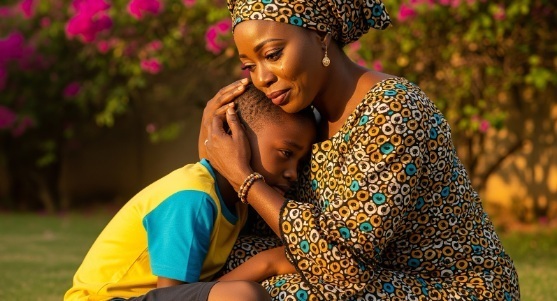
Guest Writer: Tyra Chow, HHA Death Doula Candidate
Introduction
There's a particular kind of regret that comes from words left unspoken. It's the heaviest kind.
As a death doula, I sit with families at life's end, and I've noticed something: it's rarely the big, dramatic moments people wish they'd had more of. It's the honest conversations. The "thank yous" that were assumed but never said. The apologies that waited for "someday." The love that was felt but not spoken.
These conversations don't have to be perfect. They just have to happen. And if you're reading this, you still have time.
Why These Conversations Matter
Having a conversation does not mean bringing up the past or settling a score. It is not trying to establish who was right or wrong. At the end of life, what matters more: revenge or reconciliation? pride or peace? When we choose to stay silent we may feel protected from discomfort at the time, but it also steals our chance for recovering the cherished bond with an important person.
Sometimes it is a long overdue “I’m sorry” or “I forgive you”, just a few simple words that can feel so heavy, almost impossible to utter. Often the most difficult things to say or do are the ones most needed to be said and done. Honest dialogue is what needs to be said in order to bring peace to both the dying and those who will grieve.
Creating the Right Environment
I am sometimes asked when is the “right time” to have this type of conversation. My usual response is that it's rarely "too early" but can be too late. Now is a good time.
Some can feel intimidated by hard conversations and believe that the right environment would ease the interaction somehow. From my experience, the best conversations happen when we make space for them. Here are a few suggestions when approaching a tough talk:
- Choose a comfortable, private setting
- Be present without distractions
- Permission-based approach: ask if they're ready to talk
- The power of silence and listening
Waiting for the right time or place can lead to unnecessary delay or even missing the opportunity altogether. The right environment can be anywhere and anytime, as long as we are prepared to be fully present.
The Four Pillars of Final Conversations
No matter what culture, age, or religion, there are very few instances - and especially at or near time of death - when these phrases are not received well. What we say before goodbye shapes how we heal after. Generally, what needs to be said and/or heard can be categorized into four areas. Usually, any is applicable and effective.
- Gratitude: "Thank you…”
- When choosing to lead with gratitude, just two words can honour a lifetime. Whether it is for something specific or a general thanks (for everything), the receiver can feel acknowledged for the love and care that has been given.
- Love: "I love you…”
- It is often said that when a loved one dies, the grief is ongoing because a life has ended but the love does not. It is never too early or often to express the love we feel. Mentioning specifics, not just the sentiment, can offer a more impactful message.
- Forgiveness: "I'm sorry for..." and "I forgive you for..."
- When a person reflects on their life journey, the types of events that they usually fixate on are regrets. Being able to offer forgiveness is an immense power that can free both the giver and receiver. Forgiveness can offer reconciliation and is perhaps one of the greatest gifts one could give and receive in a lifetime.
- Goodbye: "I'll be okay" or "You can let go"
- When there are no more words that can be said, a peaceful goodbye, the permission to let go, is a profound act of love to those who matter most.
When Words Are Hard
There are times when words are too hard or not possible such as when emotions overwhelm. Even in those circumstances it is not too late or impossible to let someone know they are loved. Sometimes presence speaks louder than words. Alternative ways to connect may include:
- letters
- music
- touch, like hand-holding or massage
- presence
Conclusion
These conversations take courage. They ask us to be vulnerable, to name what we usually leave unspoken, to sit with discomfort because love matters more than comfort.
But here's what I want you to know: you don't have to get it right. You don't need the perfect words or the perfect moment. What matters is that you show up. That you try. That you choose connection over silence.
The people we love don't need our eloquence. They need our honesty. They need to hear that they mattered, that they were loved, that they won't be forgotten.
Don't wait for a crisis to have these conversations. Don't wait for certainty about timing. The right time is when you still can. The right words are the true ones.
Start today. You'll never regret the words you said. Only the ones you didn't.
Practical Takeaway:
Conversation openers for your next visit
Gratitude:
- "I've been thinking about all the ways you've shaped my life. Can I share some of them with you?"
- "There's something I've never properly thanked you for..."
- "What are you most proud of in your life?"
- "You taught me so much about [patience/love/strength]. Thank you for that."
Love:
- "I want you to know what you mean to me..."
- "My favorite memory of us together is..."
- "The way you [loved/cared for/supported] me changed everything for me."
- "What do you want to make sure I know about how much you love me?"
Forgiveness:
- "I've been carrying something I need to say sorry for..."
- "Is there anything left unsaid between us that we should talk about?"
- "I forgive you for [specific thing]. I want you to know that."
- "If I ever hurt you, I hope you can forgive me."
Goodbye:
- "I want you to know that I'll be okay. We'll be okay."
- "What do you need from me to feel at peace?"
- "Is there anything you're worried about when you think about leaving?"
- "It's okay to let go when you're ready. I'll carry your love with me."
General Opening:
- "I don't want to have any regrets about things left unsaid. Can we talk?"
- "This feels hard to bring up, but it's important to me..."
- "What would you want me to remember most about you?"
The key is that these are invitations, not scripts—they should feel natural to your voice and relationship.
Monica Lau
Contact Me


